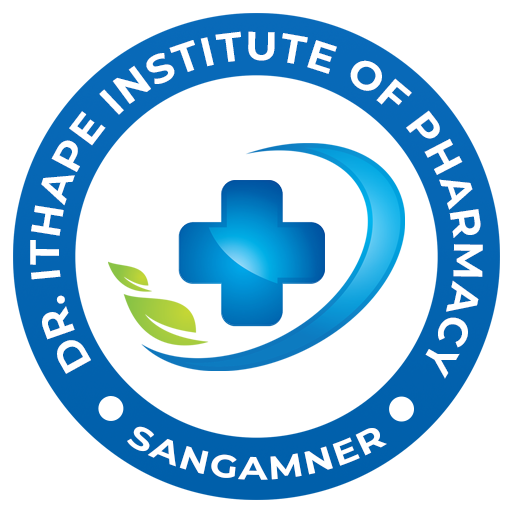The Importance of Pharmacy in Modern Healthcare
- Aniket Ithape

- Aug 25, 2025
- 3 min read

Pharmacy is one of the most vital pillars of healthcare, bridging the gap between medical science and patient care. Pharmacists are not just medicine dispensers; they play an active role in ensuring the safe, effective, and rational use of drugs. In today’s rapidly changing healthcare landscape, pharmacy professionals contribute to public health, medical research, and clinical advancements.
At Dr. Ithape Institute of D. Pharmacy, we believe pharmacy education goes beyond textbooks — it’s about preparing future professionals to handle the challenges of modern healthcare systems.
Ensuring Safe & Effective Use of Medicines:
Pharmacists are the last line of defense in patient safety when it comes to medications. Every prescription written by a doctor passes through the hands of a pharmacist, who checks for potential risks such as drug interactions, allergies, overdose possibilities, or duplicate therapies.
For example, if a patient is prescribed two different medicines that interact harmfully (like blood thinners and certain antibiotics), the pharmacist will detect this and immediately contact the doctor. This step helps prevent serious medical complications that could arise from medication errors.
Additionally, pharmacists ensure the medicine’s correct dosage, formulation (tablet, capsule, injection), and timing are understood by the patient. By doing so, they minimize side effects and maximize the drug’s effectiveness.
Patient Counseling & Education:
Pharmacists are often the most approachable healthcare professionals for patients. Unlike doctors who may be limited by time, pharmacists are usually available to clarify doubts, explain drug usage, and provide personalized advice.
During counseling, they guide patients on:
Correct way to take the medicine (before food, after food, with water, etc.)
Possible side effects and what to do if they occur
Lifestyle adjustments (like diet, exercise, avoiding smoking/alcohol) to complement the treatment
Safe storage of medicines, especially antibiotics, insulin, and inhalers
For patients with chronic conditions like diabetes, hypertension, asthma, or thyroid disorders, pharmacists become long-term partners in healthcare, checking regularly whether medicines are taken properly. This education reduces hospital visits, improves treatment outcomes, and builds patient confidence.
Supporting Public Health Initiatives:
Pharmacists don’t just work behind the counter — they actively contribute to community health and wellness programs. In many countries, pharmacists are authorized to administer vaccines and provide basic health screenings (like blood pressure, cholesterol, or sugar testing).
In rural and semi-urban areas, pharmacists are often the first point of healthcare access, especially where doctors may not be available. They guide patients on common illnesses, provide first-aid, and refer serious cases to hospitals.
During health crises like the COVID-19 pandemic, pharmacists were frontline warriors — ensuring supply of critical medicines, distributing PPE, guiding patients about vaccine safety, and busting myths about treatments.
Driving Research & Innovation:
The pharmaceutical world is always evolving with new drugs, therapies, and technologies. Pharmacists play a key role in this cycle by contributing to:
Drug Development: From initial molecule testing to formulation design.
Clinical Trials: Ensuring new medicines are safe and effective.
Pharmaceutical Technology: Developing advanced drug delivery systems (like inhalers, sustained-release tablets, and nano-medicines).
Biotechnology & AI Integration: Working on personalized medicine based on genetic profiles.
For instance, cancer treatments have advanced from generic chemotherapy to targeted drug therapies — much of this progress is fueled by pharmaceutical research where pharmacists are active contributors.
In academic institutes, pharmacy students are encouraged to undertake mini-projects, dissertations, and publications, which train them in scientific thinking and innovation.
Enhancing Accessibility & Affordability of Healthcare:
A major challenge in healthcare is making quality treatment available and affordable to everyone. Pharmacists contribute to this in several ways:
Generic Substitution: Suggesting cost-effective generic alternatives instead of costly branded drugs, making treatments accessible to low-income patients.
Efficient Supply Chain Management: Ensuring essential medicines are always available in local pharmacies, especially in rural areas.
Rational Use of Medicines: Educating patients to avoid misuse of antibiotics, painkillers, and steroids, which not only saves money but also prevents drug resistance.
Community Outreach: Running free medical camps, health checkups, and donation drives to reach underserved populations.
Pharmacists also help reduce unnecessary hospitalizations by catching prescription errors early and guiding patients to complete treatments properly. This saves families from expensive medical bills and reduces the strain on hospitals.
.png)
.png)





Comments